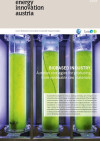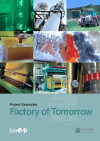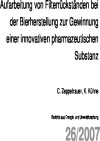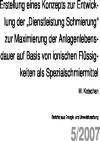Suchergebnisse für "Factsheet%3A Energietechnologien gestalten%2C die f%C3%BCr alle sinnvoll und nutzbar sind"
PH-Academy - "Passive house of the future" Academy platform for knowledge transfer between building developers
Builders and developers of residential buildings in low energy and passive house standard were invited to an academically moderated direct exchange of experiences, to turn them into competent users of new technologies.
Alternative insulation made from modified lignocellulosic fibers
Wood as the raw material for a new insulation material
Energy centre for the thermal conversion of biogenous raw materials and residues of a region to produce heat, electricity, SNG and liquid biofuels II
Production of synthesis gas from biological fuels and residues using steam blown gasification. This synthesis gas will be used for polygeneration especially for heat, power, gaseous and/or liquid fuels.
plusFacades - International know-how- and knowledge transfer of "intelligent Facade systems" for Austrian players and key personnel
The project proceeds from the idea that prefabricated intelligent facade systems represent a promising technology for the energy efficient refurbishment of buildings. A goal is to process the present international state-of-the-art and the existing know-how to this topic for Austrian experts.
Beacon of innovation gugler cross media, ecoeffective zero energy cross media enterprise featuring zero-emission, zero energy, zero waste
The aim of the flagship project is a new dimension of sustainability (cradle to cradle, ecoeffective zero energy enterprise) for business operation and building, which means zero emission, zero energy, zero waste. This will be shown on the basis of a beacon of innovation: Gugler GmbH, a modern sustainable media services enterprise (traditional print and new media) will extend their current building from about 2100 square meters and about 90 employees to about 5,000 square meters.
Fibre composites with natural adhesive
Developing of suitable bonding agents, fibres and processing technologies for the production of form stable fibre composites made of natural components. Production of prototypes like boards and moulded parts. Material testing.
The Paper Factory in the Year 2030
Paper factory in the year 2030 as an integrated part of a sustainable economy and a supplier of sustainable paper products fulfilling criteria for sustainability at highest possible level.
IEA Hydrogen (Hydrogen TCP)
The Hydrogen TCPs coordinates joint R&D activities with the aim of advancing the development and deployment of safe and sustainable technologies for the production, storage and supply of clean and affordable hydrogen and its derivatives for use in industry, mobility, heating and electricity.
Biobased Industry

Austrian strategies for producing from renewable raw materials
energy innovation austria
3/2015
Herausgeber: BMVIT and Klima- und Energiefonds
Englisch, 8 Seiten
Downloads zur Publikation
Erfolgreiche Beispiele aus der Programmlinie Fabrik der Zukunft

Herausgeber: Bundesministerium für Verkehr, Innovation und Technologie (BMVIT)
Englisch, 36 Seiten
Downloads zur Publikation
smartEXT - extended application boundaries for proven passive house technology
The present study aims to explore the application options for compact units (ventilation devices including micro heat pumps, developed for passive houses) in low energy buildings. Compact ventilation units for heat recovery, heating and domestic hot water shall bear the basic heating load, whereas peak loads shall be covered by newly-developed auxiliary heating equipment combined with intelligent control algorithms. This allows increased energy efficiency as well as cost effectiveness together with higher living quality and lower ecological load.
Field test of a virtual power Plant comprising 30 pellet-boiler fired micro-CHP modules
A virtual biomass plant comprising 30 micro-CHP-Modules, each of them integrated into an existing pellets-boiler in the Austrian region of eastern Styria is to be tested. The goal of this project is to gain experience and to introduce a new sustainable technology.
HY3GEN - A Regenerative Building
The "third generation hybrid building" (HY3GEN), whose main features are being defined in this project, has expanded this approach to include the integration of aspects of efficient resource utilization in construction and operation as well as the use of regenerative raw materials and renewable energy.
Aufarbeitung von Filterrückständen bei der Bierherstellung zur Gewinnung einer innovativen pharmazeutischen Substanz

Schriftenreihe
26/2007
C. Zeppelzauer, K. Kühne
Herausgeber: Bundesministerium für Verkehr, Innovation und Technologie
Deutsch, 43 Seiten
Downloads zur Publikation
Development of a Cost-Benefit-Tool: costs and benefits of energy efficient and ecologic buildings
Development of a cost-benefit-tool which reaches beyond a pure cost approach and also recognizes the benefits of a building for its inhabitants and users. The inclusion of benefits is based on existing evaluation systems, especially on the Austrian building evaluation system TQB - Total Quality Building, which has been revised in 2009.
IEA Bioenergy Task 40: Deployment of biobased value chains (Working period 2022 - 2024)
Bioenergy Task 40 traditionally focused on international trade and supply chains of biomass for bioenergy. Starting in 2018, the systems view was broadened, also to better meet Austrian requirements. The supply chain focus was maintained, but with a broader premise: The establishment of bio-based value chains for a sustainable and fair bioeconomy.
Inter-linked design as a strategy towards sustainable buildings - removing deficiencies of learning and of diffusion

The aim is to investigate the role of inter-linked design team organisation in the design of sustainable buildings and to formulate ready-to-use recommendations and guidelines for dissemination.
Reporting about Sustainability: In 7 Schritten zum Nachhaltigkeitsbericht

Ein allgemeiner Leitfaden zur Nachhaltikeitsberichterstattung
Österreichisches Institut für Nachhaltige Entwicklung
Herausgeber: BMVIT - Bundesministerium für Verkehr, Innovation und Technologie
Deutsch, 56 Seiten
Downloads zur Publikation
Erstellung eines Konzeptes zur Entwicklung der "Dienstleistung Schmierung" zur Maximierung der Anlagenlebensdauer auf Basis von Ionischen Flüssigkeiten als Spezialschmiermittel

Schriftenreihe
05/2007
DI Dr. Michael Kotschan MBA
Herausgeber: Bundesministeriums für Verkehr, Innovation und Technologie
Deutsch, 43 Seiten
Downloads zur Publikation
Green Market Report Austria Compact - Facts and figures of green roofs and facades industry in Austria
First comprehensive data collection of installed green roof and green facades in Austria and exploration of current challenges and future growth potential für green roof and walls applications involving all stakeholders within the green industries value chain.
